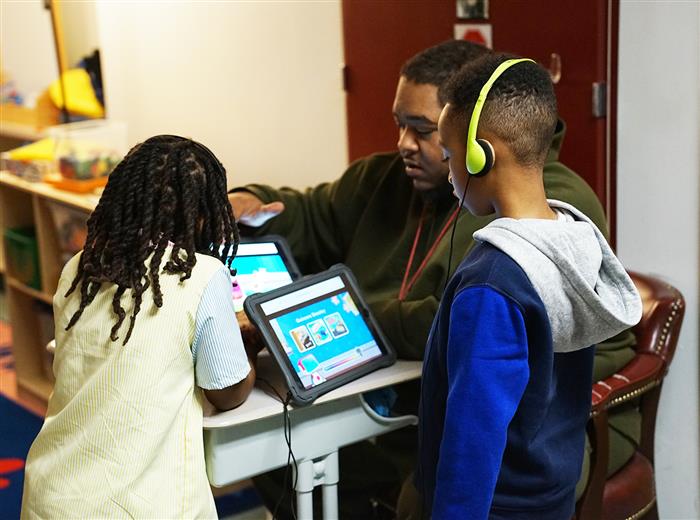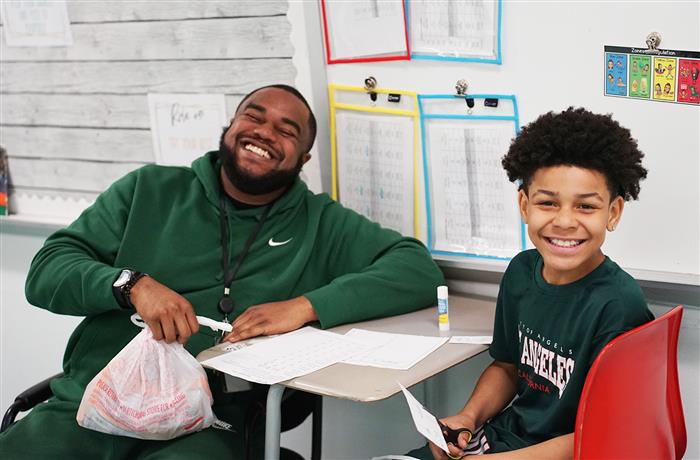
To most students, Bill Sanders and George Tyler are known by their students as Mr. Sanders and Mr. Tyler. For one student, though, Sanders is known as ‘dad’ and Tyler is known as ‘big dog’.
Sanders and Tyler are members of the Duquesne City School District’s Behavioral and Emotional Support Team — or BEST program for short. The six-person team — which is supervised by Benetta Thomas – is staffed by Pressley Ridge and placed in the district’s three emotional support classrooms as Student Intervention Specialists.
Their job — in brief — is to provide an additional level of support and guidance in three emotional support classrooms, which are separated into the K-2, 3-5 and 6-8 grade levels. In order to do their job well, though, it’s imperative that they build uniquely strong relationships with their students. So strong, in fact, that some students might look at them as father figures or role models.
“I try to be everything for them,” Sanders said.
The BEST program started at the Duquesne City School District in the 2022-23 school year. Sanders and Tyler were on the ground floor of the project, working first in the K-2 classroom. This school year, the program expanded from two to six team members, with support from Project SEEKS SES, a partnership between the Allegheny Intermediate Unit (AIU) and the Allegheny County Health Department (ACHD), ten school districts and three universities to explore a variety of resources to address trauma, behavior and mental health supports for students and staff.

Students put into emotional support classrooms exhibit challenging behaviors, like difficulty establishing relationships or utilizing coping skills. Hence, all of the BEST program is trained in CPI (Crisis Prevention Intervention), trauma-informed practices, and restorative practices, making them well-qualified to help students manage these behaviors.
“Overall, I think it’s been really good and it’s helped our teachers to be able to function in that space with a strong emotional support program,” said Rachel Butler-Pardi, the district’s Mental Health and Behavior Support Coordinator. “It’s a very cohesive model where they’re working together and learning to identify any of the challenges.”
The BEST team is carefully crafted, with a special focus put on hiring team members that are from or familiar with the Duquesne City School District. Tyler is a 2007 graduate of the district, while Sanders also attended the school before moving on to graduate from the East Allegheny School District.
Being able to return to their home district has been quite gratifying, Tyler and Sanders agreed. But beyond that, it’s helped them develop strong relationships with the students, knowing they can bond over a common ground of having once walked the same hallways.
“We’re from the community and kind of know the kids outside of school. We know their parents well, and we know some of their stories. We just try to be there for them,” said Sanders.
“When you come here, it’s just like a family. You get to love these kids from their stories, and just knowing their history. You just try to make them succeed.”
The number of success stories are countless. Tyler remembers a student that would consistently roam the hallways, but now stays in class. Another student seldom would talk to anybody, but now will initiate conversations with a number of people. Another student, in Sanders’ words, was “doing the most” and wouldn’t come to class.
“We had a week or two with her. After that she would hug me when she got it in there and we got her milk and cereal. Every week we made progress,” Sanders said.
Beyond anecdotes, Pamela Zackel-Dunnabeck, the district’s Director of Special Education Services, said that both regular education and special education teachers, as well as administrative staff, have seen a decrease in the intensity of the behaviors of the students that are participating in the BEST program. Behavioral data is collected monthly and compared to the previous month’s and last year’s data.
Jenna Guido and Amber Toner — both emotional support teachers in the district — said that the BEST program’s support has been instrumental in their classrooms. Guido noted how she often teaches the value of coping skills for her students, and that the BEST program is able to help them utilize those skills by taking them on walks. Butler-Pardi, additionally, said she’s been able to bring extra programming into the emotional support classrooms — like Venture Outdoors — due to the extra level of support in the classrooms.
“The kids have such a good rapport with them. That is helpful to have those extra people to go to. Sometimes they want to work next to them because they really love them,” Toner said. “And I think any type of connection that our kids can make is helpful for them. Any positive relationship is so beneficial.”
With the help of the BEST team, Guido said it’s been most gratifying seeing her students progress and recognize their own potential. Students that once might’ve dreaded coming to school are now eagerly awaiting it, knowing they’ve got plenty of friends waiting for them.
“Our kids want to come to class in the morning. They’re there as soon as the doors open in our rooms. There’s a difference now in their motivation. They want to come to class and they want to do better for themselves,” said Guido.
“They can do so much, and they might’ve not known that. But with that extra support, they can see it. It’s like an aha moment.”
